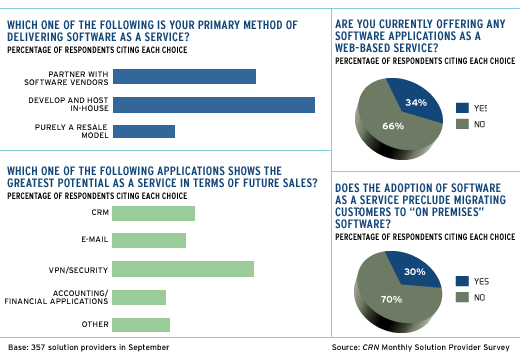Special Delivery: Applications As A Service
Such a method of delivery offers many advantages to both solution providers and their customers. Solution providers are able to garner an ongoing revenue stream with a long-term commitment from their customers, backed by contracts and proprietary technologies. For customers, one of the major selling points is a reduced startup cost, which proves to be very valuable for smaller businesses that need advanced software applications but can&t afford the high costs normally associated with boxed software.

With those advantages in mind, it is a wonder that more solution providers have not already gone this route. Perhaps the answer lies with the fact that 50 percent of those offering hosted applications had to build the solution in-house from scratch, which can prove to be quite expensive. Another 35 percent of solution providers have turned to the channel by building partnerships with ISVs to promote and market their solutions.
The benefits of delivering applications as a service are clear. According to CRN research, 70 percent of respondents said they feel that initially starting with a service-based solution does not preclude “upgrades” to traditional on-site applications, a fact that can lead to future sales and integration opportunities.
Since security is critical to any business operation, it&s also a major opportunity that offers another cost-saving benefit. Security solutions need to be flexible, complex and constantly updated, so it makes sense to share the maintenance burden with others. Some 35 percent of survey respondents cited VPN/security as one of the applications offering the most potential as a service. CRM, meanwhile, was chosen by 20 percent of solution providers, evidence that it proves to be a valuable capability for the traveling worker or multisite office and lends itself to work well as a service. E-mail, for its part, offers the benefit of spam control and other security technologies and was cited by 18 percent of respondents. Accounting and financial applications, meanwhile, were chosen by only 13 percent of solution providers, perhaps an indication that most companies do not want to place corporate data of that nature in the hands of others.
